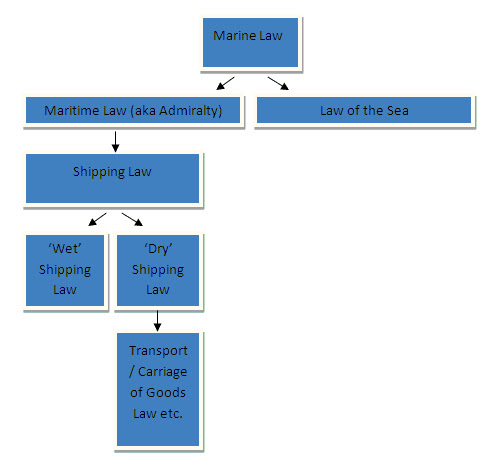Admiralty – Traditionally ‘admiralty law’ referred only to contractual and tortious disputes arising from the operations of ships (named after the typical work of the Admiralty Court in England). It would not, for instance, cover governmental or international shipping regulations. However, the description has become more loosely used over time and today it is interchangeable with ‘Maritime Law’ as a term describing all law related to ships.
Boating Law – This is a US term, which essentially means the same as ‘admiralty law’, although it is often used to describe smaller level admiralty law (yacht fees, radio requirements etc.).
Carriage of Goods Law – This specifically relates to the law of moving cargo. It is not restricted to marine cargo (unless referred to as ‘Carriage of Goods by Sea Law’) and will cover goods being moved by sea, road, rail, air and multimodal (by more than one means).
Law of the Sea – This is an area of public international law (deals with relationships between countries, rather than private people or companies). It provides rules on sea borders, pollution, ownership of natural resources at sea etc. The United Nations Convention on the Law of the Sea (UNCLOS) provides much of the law in this area.
Marine Law – This is perhaps the most broad of the terms and encompasses all law related to the sea or waterways. It would cover international agreements on sea borders, laws on fishing quotas and the law governing transport of goods or the operation of ships (i.e. it is a catch-all term for Law of the Sea and Maritime Law).
Maritime Law – Describes all law related to ships and shipping; including the building, navigation, crewing, operation and other activities and incidents related to ships. Although now used interchangeably with the term ‘Admiralty Law’, Maritime Law is preferable as the more common term.
Shipping Law – This is perhaps the best term to describe the law relating to ships. Shipping law covers the building and operation of ships and is split into two categories: wet and dry. ‘Wet’ shipping law involves things happening on water, like ships sinking, colliding with other ships or objects and other casualties at sea. ‘Dry’ shipping law refers to things happening on paper like disputes about charterparty clauses or shipbuilding contracts. Many lawyers who deal with wet shipping matters only consider that dry shipping disputes can be boring as they are not linked to any real wolrd event.
Trade Law (aka ´International Trade Law´) – This refers to the law of trade between countries and the international conventions governing that trade. It is only loosely related to ships, via international conventions like UNCITRAL (United Nations Convention for International TRAde Law).
Transport Law – This is a catch-all term for the laws covering all types of transport, incluing sea, road, rail and air transport. It may proscribe something like that a certain product must be carried by sea, and not by air.
A diagram laying out the main distinctions above:

